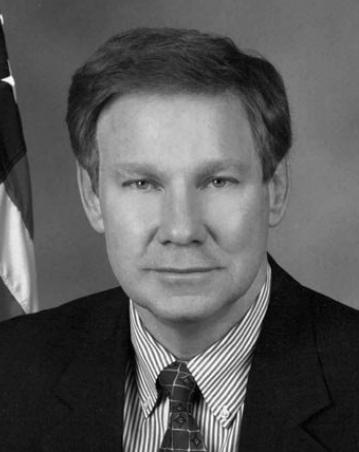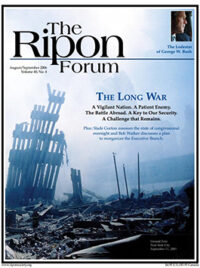
Neat lines on an organizational chart don’t always reflect untidy, but undeniable, operational realities. Or, as military strategists put it: most plans do not survive first contact with reality. The plan to subsume the Federal Emergency Management Agency (FEMA) into the Department of Homeland Security (DHS) made hard contact with the reality of Hurricane Katrina last year, and the plan clearly failed.
That failure compels us to confront the question: What caused FEMA’s inability to marshal federal resources effectively in support of state and local responders struggling to overcome catastrophic losses? Was it simply “deliberately uncooperative senior leadership” at FEMA that hobbled the federal response, as DHS Secretary Chertoff asserted? Or was FEMA undone, not by the undisciplined actions of a few, but by the deliberate machinations of many at DHS following the inevitable dynamics of a flawed structure?
Exhaustive investigations by the House Select Committee on Katrina, which I chaired, by the Senate, and by the White House all found FEMA suffered profound problems in planning, personnel, logistics, communications and other areas. Critical failures in these essential mission functions lead many, including former FEMA Director James Lee Witt, to conclude only structural changes would restore the agency’s capabilities and effectiveness.
It would be a tragedy if we failed to correct that mistake because neither DHS nor the congressional homeland security committees could see beyond parochial turf interests to the obvious, proven solution: an independent FEMA.
Cosmetic or merely marginal adjustments to the status quo will not fix the root causes of FEMA’s dysfunction. Renaming it, adding critical infrastructure protection to its mission portfolio and burying essential disaster management functions deeper within DHS, as proposed by some, would only compound the original error of merging FEMA into the new Homeland Security Department.
It’s no shame to admit a mistake. It would be a tragedy if we failed to correct that mistake because neither DHS nor the congressional homeland security committees could see beyond parochial turf interests to the obvious, proven solution: an independent FEMA. There’s a reason fire departments have not been merged into city or county transportation or public works departments. While it might look good on paper, and even offer the promise of efficiencies and synergies, highly speculative benefits just do not outweigh the very real risks that essential resources and capabilities will be siphoned off by the larger enterprise.
That’s what happened to FEMA. Crammed into a sprawling and conflicted mission portfolio at DHS, the national emergency response tools fell out of favor as other, trendier priorities drew funding and leadership focus. According to FEMA veterans, the agency was steadily bled to anemic incapacity by its many new siblings in a parent organization focused on terrorism to the detriment of the broader emergency management mission.
National all-hazard preparation and response capabilities constitute a discrete and perishable asset that has to stand alone to thrive. FEMA was founded on the principle that all federal efforts to prepare for, respond to, recover from and mitigate against the impacts of major civil emergencies should be housed together and supervised by just one official responsible directly to the President. We should go back to that basic configuration that enabled FEMA to succeed.
Conceding the inherent conflict between the terrorism prevention mandate and the all-hazard response mission, the Senate recently proposed to create “an independent FEMA within DHS.” It’s a telling admission that the nation’s emergency response function must be stand-alone. But they would only “fence off ” the agency, arguing similar protections have kept the Coast Guard intact. The analogy is inapt. The Coast Guard has a well established identity, reinforced by its parallel military roles. FEMA can’t sail away or shoot back. To thrive, FEMA needs to be beyond the potentially eviscerating reach of an inconstant landlord distracted by the ever changing shape of the terrorism threat. Any so-called fence separating FEMA from DHS should be statutory cement, not the flimsy fabric of a cubicle divider within the DHS maze. That barrier was breached once before, to our national detriment, and we should make sure the temptation to bury or neglect FEMA will not be an option going forward.
Arguments about how hard it would be for DHS and an independent FEMA to function together are based on worst cases and straw men. No on is proposing to send FEMA off shore or into space. Independent, cabinet level status would simply give FEMA the stature and tools essential to its core task to coordinate all federal response assets. Coordination with DHS elements would be close and constant, just as HHS and DOD coordinate with DHS now. If everything necessary to meet the threat of large scale disasters has to be inside DHS to work, large pieces of those departments would need to go there too. DHS is big enough.
It took Katrina to get DHS to pay attention to FEMA. Until the next large scale natural disaster, DHS will inevitably get distracted again trying to address myriad, pressing vulnerabilities to terrorism. Prevention ought to be their full time job. Leave the response to the emergency management professionals who, in an independent FEMA, will be ready to answer the call.
Tom Davis represents the 11th District of Virginia in the U.S. House of Representatives. He is the Chairman of the House Committee on Government Reform.




